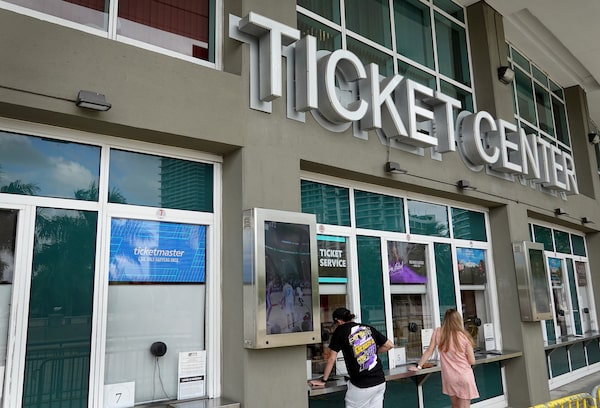
The FTX Arena ticket window on Nov. 18, in Miami, Fla.Joe Raedle/Getty Images
The Eras Tour, or is it the errors tour?
The debacle surrounding last week’s online sales for Taylor Swift’s first tour in five years was so frustrating that fans of a certain vintage were longing for the days of lining up for concert tickets in person.
Here’s what happened:
The tour announcement
After the release of Taylor Swift’s blockbuster 10th album (Midnights) in October, a schedule of U.S. stadium concerts beginning in March, 2023, was announced on Nov. 1. International dates (including Canada) are expected to be revealed later. As is the practice with high-demand shows, a Ticketmaster Verified Fan program was put in place to filter out bots (automated software applications) from ticket-buying queues, shorten wait times and make the whole process smoother. Typical of major tours, a presale for holders of a certain credit card (in this case, Capital One) was set for Nov. 15 to 17, with tickets for the general public going on sale Nov. 18.
The outage
On Nov. 15, millions of Swift fans overwhelmed Ticketmaster’s website, causing periodic outages, dropped connections and hours-long waits. Although more than two million tickets were sold, passcode validation errors caused many hopeful buyers to lose tickets already placed in their “cart.” All told, about 1.5-million preregistered fans were unable to score tickets, which were priced from US$49 to US$449 each. The frustration was summed up by Dave Pell, who attempted to score a ticket for his daughter. “I’m a failure as a father,” he wrote in his popular NextDraft newsletter.
The initial response
Greg Maffei, the chairman of Live Nation Entertainment, the parent company of Ticketmaster and concert-promoter colossus Live Nation (which is not promoting the Eras tour), appeared to throw the Shake It Off singer herself under the bus. “It’s a function of Taylor Swift,” he said during a Nov. 15 appearance on CNBC about the ticket-site meltdown. “We had 14 million people hit the site, including bots, which are not supposed to be there.” According to Maffei, the demand “could have filled 900 stadiums.”
Politicians react swiftly
New York Democratic congresswoman Alexandria Ocasio-Cortez tweeted that the merger of Ticketmaster and Live Nation was a “monopoly” that never should have been approved. On Nov. 17, Sen. Amy Klobuchar of Minnesota sent a letter to Live Nation Entertainment’s president and chief executive officer Michael Rapino, voicing her unease with the live music industry. “Ticketmaster’s power in the primary ticket market insulates it from the competitive pressures that typically push companies to innovate and improve their services,” wrote the Democratic senator, who chairs the Senate Judiciary Subcommittee on Competition Policy, Antitrust, and Consumer Rights. “That can result in dramatic service failures, where consumers are the ones that pay the price.”
Public on-sale called off
On Nov. 17, Ticketmaster announced that “due to extraordinarily high demands on ticketing systems and insufficient remaining ticket inventory to meet that demand,” the public ticket sale set for the following morning had been cancelled. The likelihood is that were little if any seats to sell at that point. According to Ticketmaster, more than 2.4 million tickets were sold to 52 concerts.
Swift responds
The singer frustrated her fans – Swifties, in the parlance – by failing to address the ticket fiasco promptly. After days of silence, Swift issued a statement on Instagram on Nov. 18, saying that it was “excruciating for me to just watch mistakes happen.” She went on to say that it “really pisses me off” that the fans who did manage to land tickets felt like they had to go through “several bear attacks to get them.”
Ticketmaster apologizes
Also on Nov. 18, the ticketing giant apologized on Twitter to Taylor, as well as her fans – “especially those who had a terrible experience trying to purchase tickets.” The statement linked to a lengthy explanation of how its system had broken down. Ticketmaster said the “unprecedented” traffic on its site amounted to 3.5 billion total system requests, which was four times its previous peak.
Investigations launched
Attorneys-generals in Nevada, Pennsylvania and Swift’s home state of Tennessee are now looking into the debacle. “Trouble, trouble, trouble,” tweeted Pennsylvania Attorney-General Josh Shapiro in a reference to Swift’s 2012 hit song I Knew You Were Trouble as he asked the public to file complaints with his office. In Tennessee, Attorney-General Jonathan Skrmetti said he wants to ensure consumers have a fair shot at buying tickets; the Nevada attorney-general’s office said it was investigating Ticketmaster for “alleged deceptive or unfair trade practices.”
 Brad Wheeler
Brad Wheeler